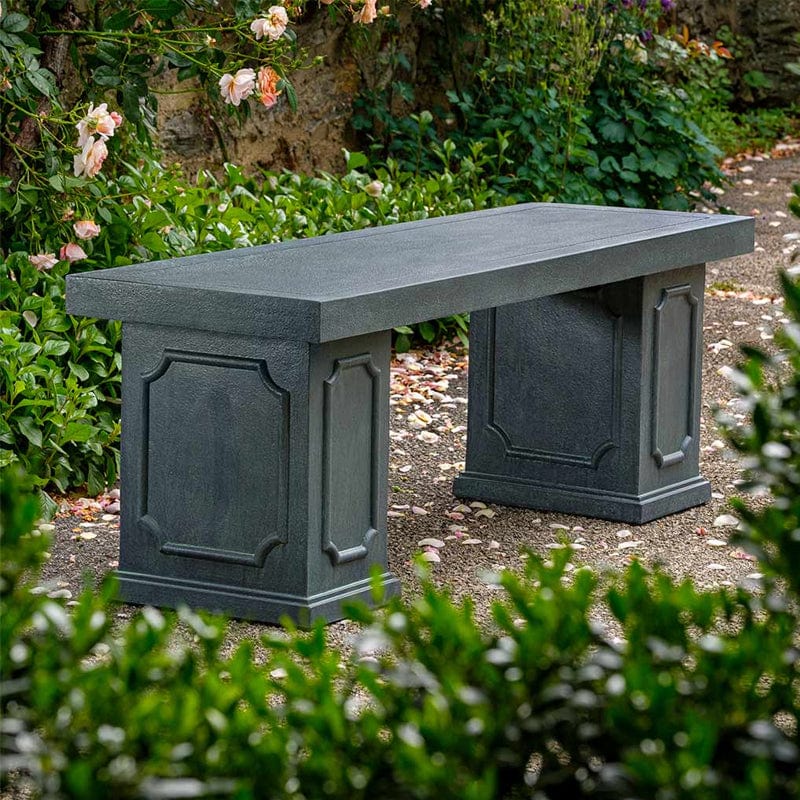Stone benches have been a staple in the design of traditional Japanese Zen gardens for centuries. These gardens are designed to create a space for reflection and meditation, and the yard benches play a crucial role in this process. They are typically made from natural stones such as granite, basalt, or limestone, and are placed in strategic locations throughout the garden.
The design of a Zen garden is based on the principles of simplicity, harmony, and balance. The stone benches are carefully placed to create a sense of balance and symmetry, and are often surrounded by carefully arranged rocks, gravel, and plants. The benches are designed to be functional as well as beautiful, and are often positioned to take advantage of natural views or to provide a sense of privacy and seclusion.
Stone benches are an essential element in the design of Zen gardens, and are a testament to the enduring appeal of traditional Japanese design. They provide a space for quiet contemplation and reflection, and are a reminder of the importance of simplicity and balance in our lives. Whether you are designing a new garden or simply looking for a way to create a peaceful and meditative space in your home, a stone bench can be a valuable addition to your design.
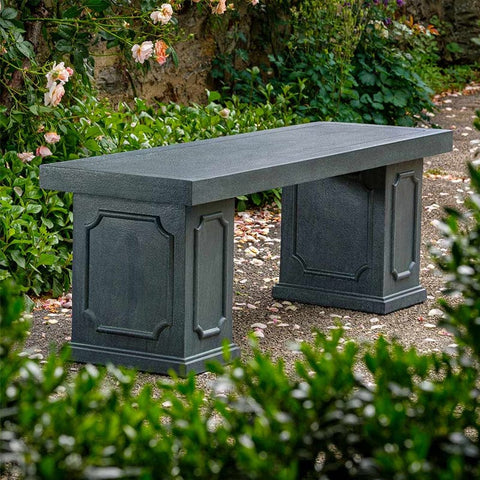
The Essence of Zen Garden Design
Defining Zen Aesthetics
Zen garden design is a form of Japanese garden design that aims to create a space for contemplation and meditation. It is characterized by its minimalist design, use of natural materials, and emphasis on creating a sense of harmony and balance. The essence of Zen aesthetics is to create a space that is simple, yet beautiful, and that encourages reflection and introspection.
One of the key defining features of Zen aesthetics is the use of natural materials. This includes materials such as stone, gravel, sand, and wood. These materials are chosen for their natural beauty and their ability to create a sense of calm and tranquility.
Another important aspect of Zen aesthetics is the use of negative space. This refers to the intentional use of empty space in the design of the garden. By leaving areas of the garden empty, the designer creates a sense of openness and spaciousness that encourages reflection and contemplation.
Principles of Zen in Stone Bench Placement
One of the key elements of Zen garden design is the use of stone benches. These benches are typically placed in strategic locations throughout the garden to provide a space for reflection and contemplation. The placement of these benches is guided by a number of principles that are central to Zen aesthetics.
One of the key principles of Zen garden design is the use of asymmetry. This means that the placement of objects in the garden is intentionally asymmetrical, creating a sense of balance and harmony that is not based on symmetry.
Another important principle of Zen garden design is the use of focal points. These are objects or areas in the garden that draw the eye and create a sense of visual interest. Stone benches are often used as focal points in Zen gardens, as they provide a space for contemplation and reflection.
Overall, the essence of Zen garden design is to create a space that is simple, yet beautiful, and that encourages reflection and introspection. By using natural materials, negative space, and strategic placement of stone garden benches, designers can create a space that is both visually stunning and spiritually uplifting.
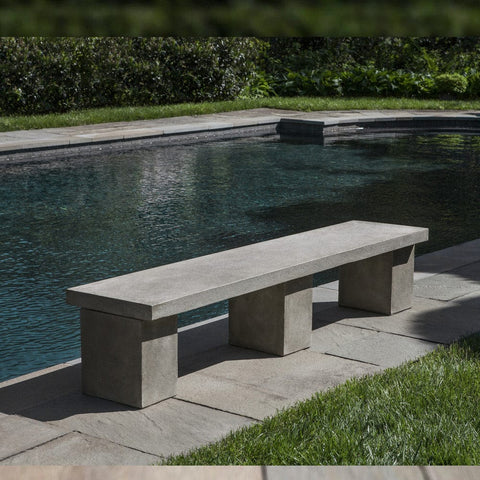
Selecting Materials for Stone Benches
Types of Stone
When selecting materials for stone benches in a Zen garden, it is important to consider the type of stone that will be used. There are many different types of stone available, each with its own unique characteristics and properties. Some popular options include granite, sandstone, limestone, and marble.
Granite is a durable and weather-resistant stone that is often used for outdoor applications. Sandstone is a softer stone that is available in a range of colors and textures. Limestone is a popular choice for its natural beauty and versatility. Marble, although less durable than granite, is a luxurious option that can add a touch of elegance to any garden design.
Durability and Weather Resistance
When selecting stone for a bench, it is important to consider its durability and weather resistance. Outdoor garden benches will be exposed to the elements, so it is important to choose a material that can withstand the effects of rain, wind, and other weather conditions.
Granite is a popular choice for its durability and weather resistance. It is a hard and dense stone that can withstand heavy use and exposure to the elements. Sandstone and limestone are also durable options, although they may require more maintenance over time. Marble, although beautiful, is less durable and may require more frequent maintenance to keep it looking its best.
Sourcing Ethical Materials
When selecting stone for a Zen garden bench, it is important to consider the ethical implications of the materials being used. Some stones may be sourced from quarries that use unethical labor practices or damage the environment.
To ensure that the stone being used is ethically sourced, it is important to research the supplier and the quarry where the stone was extracted. Look for suppliers that prioritize ethical and sustainable practices, and consider using recycled or reclaimed stone whenever possible. By choosing ethically sourced materials, you can create a beautiful Zen garden that aligns with your values and principles.
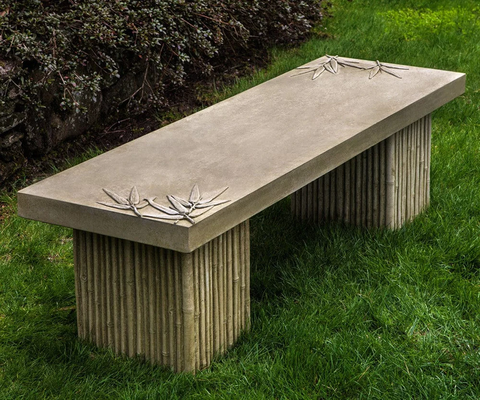
Incorporating Stone Benches into Zen Gardens
Stone benches are an essential element in creating a space for reflection in Zen garden design. They provide a place for visitors to sit and contemplate the beauty of the garden, while also adding to the overall aesthetic of the space. In this section, we will explore the different ways in which stone benches can be incorporated into Zen gardens.
Strategic Placement for Reflection
When incorporating stone benches into a Zen garden, it is important to consider their placement carefully. The goal is to create a space that encourages visitors to sit and reflect, while also allowing them to take in the beauty of the garden. Ideally, benches should be placed in areas that offer a view of the garden's most striking features, such as a waterfall or a carefully placed rock formation.
Integrating with Natural Elements
One of the key principles of Zen garden design is the integration of natural elements. Stone benches can be used to further this principle by incorporating natural materials into their design. For example, a bench made from rough-hewn stone can blend seamlessly with the surrounding rocks and boulders. Alternatively, a bench made from smooth, polished stone can provide a striking contrast to the rough textures of the garden.
Balancing Functionality with Minimalism
Another important consideration when incorporating stone benches into Zen gardens is balancing functionality with minimalism. Stone benches should be designed to be functional, comfortable, and durable, without detracting from the overall simplicity and minimalism of the garden. This can be achieved through the use of clean lines, simple shapes, and natural materials.
In conclusion, stone benches are an essential element in creating a space for reflection in Zen garden design. By considering their placement, integrating them with natural elements, and balancing functionality with minimalism, designers can create a space that is both beautiful and functional.
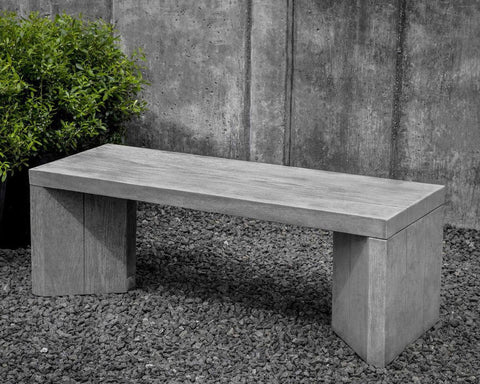
Design Considerations for Stone Benches
Stone garden benches are a common feature in Zen gardens, providing a space for reflection and contemplation. When designing a Zen garden, it is important to consider several factors when selecting and placing stone benches. This section will explore three key design considerations for stone benches in Zen garden design.
Ergonomics and Comfort
When selecting a stone garden bench, it is important to consider the ergonomics and comfort of the bench. The bench should be designed to provide a comfortable seating position, with a backrest that supports the lower back. The height of the bench should also be considered, as it should be at a comfortable height for the user.
Visual Harmony with Surroundings
Stone garden benches should be selected and placed in a way that creates visual harmony with the surrounding environment. The bench should be made of a material that complements the other elements of the Zen garden, such as the rocks and gravel. The size and shape of the bench should also be considered, as it should fit seamlessly into the overall design of the garden.
Size and Scale in Relation to the Garden
The size and scale of the outdoor garden bench should be considered in relation to the overall size and scale of the Zen garden. A large bench may overwhelm a small garden, while a small bench may be lost in a larger garden. The placement of the bench should also be considered, as it should be placed in a location that allows for easy access and contemplation.
In summary, when designing a Zen garden, it is important to consider several factors when selecting and placing stone benches. The bench should be designed for comfort, complement the surrounding environment, and be appropriately sized for the garden. By considering these design considerations, stone benches can provide a peaceful and reflective space in any Zen garden.
The Role of Stone Benches in Meditation
Stone benches are an essential element in Zen garden design, providing a space for reflection and meditation. They offer a peaceful place to sit and contemplate, surrounded by the natural beauty of the garden. Let's explore the role of stone benches in meditation, including how they facilitate mindfulness practices and foster a connection with nature.
Facilitating Mindfulness Practices
Mindfulness is a practice that involves being present in the moment and fully engaged with one's surroundings. Stone garden benches can help facilitate mindfulness practices by providing a comfortable and stable place to sit and focus on the present moment. The solid and grounding nature of the stone garden bench can help to anchor the meditator's attention, allowing them to let go of distractions and fully immerse themselves in the present moment.
Fostering a Connection with Nature
Stone benches are often placed in areas of the garden that offer beautiful views of the surrounding landscape. This can help to foster a connection with nature, allowing the meditator to feel more grounded and connected to the natural world. The use of natural materials, such as stone, also helps to create a sense of harmony and balance within the garden, further enhancing the meditative experience.
In conclusion, yard benches play a crucial role in Zen garden design by providing a space for reflection and meditation. They facilitate mindfulness practices and foster a connection with nature, helping to create a peaceful and harmonious environment for meditation.
Conclusion
Stone benches have been a staple in Zen garden design for centuries. They provide a space for reflection, meditation, and relaxation. The natural materials used in their construction blend seamlessly with the surrounding environment, creating a sense of harmony and balance.
Stone benches come in a variety of shapes and sizes, allowing for customization to fit any garden design. They can be placed in strategic locations to provide a focal point or to create a sense of flow throughout the garden.
When selecting a stone bench for a Zen garden, it is important to consider the durability and weather resistance of the material. Granite, limestone, and sandstone are popular choices due to their ability to withstand the elements.
In addition to their functional benefits, yard benches add an aesthetic element to Zen garden design. The natural textures and colors of the stone create a sense of tranquility and simplicity, which are essential components of Zen philosophy.
Overall, unique outdoor benches are a valuable addition to any Zen garden design. They provide a space for quiet contemplation and reflection, while also enhancing the overall aesthetic of the garden.

